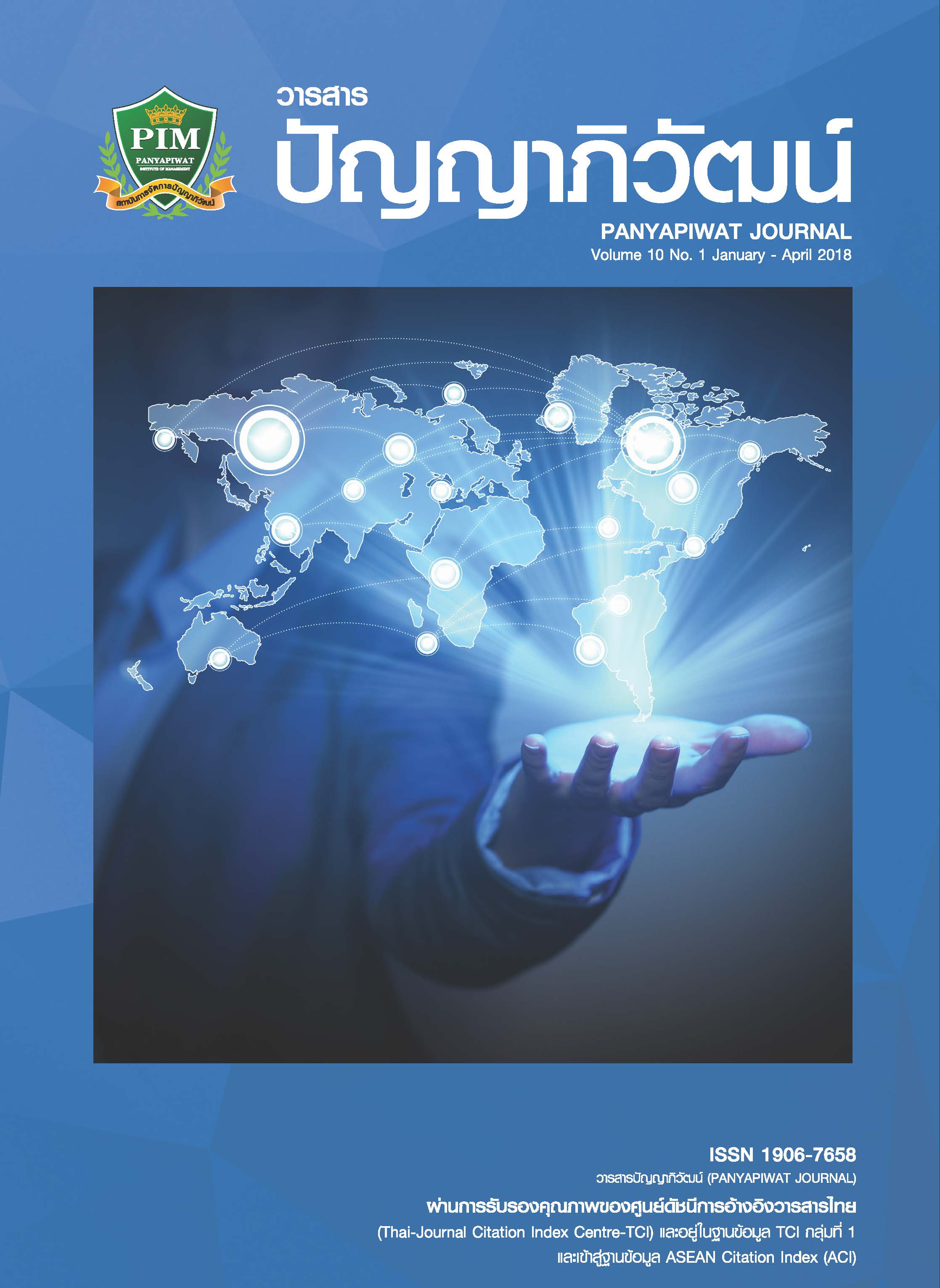การจัดการเรียนการสอนแบบบูรณาการผ่านการเรียนรู้เพื่อการเปลี่ยนแปลง และการให้บริการชุมชนเพื่อพัฒนาผู้นำทางการศึกษาที่รับผิดชอบต่อสังคม
Main Article Content
บทคัดย่อ
บทความนี้มีวัตถุประสงค์เพื่อนำเสนอรูปแบบการจัดการเรียนการสอนแบบบูรณาการผ่านการเรียนรู้เพื่อการเปลี่ยนแปลงและการให้บริการชุมชนเพื่อพัฒนาผู้นำทางการศึกษาที่รับผิดชอบต่อสังคม ซึ่งผู้วิจัยได้พัฒนาขึ้นผ่านกระบวนการวิจัยและพัฒนาการจัดการเรียนการสอนมาเป็นเวลากว่า 4 ปี ในหลักสูตรปริญญาโทสาขาวิชาการบริหารการศึกษา คณะศึกษาศาสตร์ มหาวิทยาลัยเกษตรศาสตร์
Article Details
“ข้าพเจ้าและผู้เขียนร่วม (ถ้ามี) ขอรับรองว่า บทความที่เสนอมานี้ยังไม่เคยได้รับการตีพิมพ์และไม่ได้อยู่ระหว่างกระบวนการพิจารณาลงตีพิมพ์ในวารสารหรือแหล่งเผยแพร่อื่นใด ข้าพเจ้าและผู้เขียนร่วมยอมรับหลักเกณฑ์การพิจารณาต้นฉบับ ทั้งยินยอมให้กองบรรณาธิการมีสิทธิ์พิจารณาและตรวจแก้ต้นฉบับได้ตามที่เห็นสมควร พร้อมนี้ขอมอบลิขสิทธิ์บทความที่ได้รับการตีพิมพ์ให้แก่สถาบันการจัดการปัญญาภิวัฒน์หากมีการฟ้องร้องเรื่องการละเมิดลิขสิทธิ์เกี่ยวกับภาพ กราฟ ข้อความส่วนใดส่วนหนึ่งและ/หรือข้อคิดเห็นที่ปรากฏในบทความข้าพเจ้าและผู้เขียนร่วมยินยอมรับผิดชอบแต่เพียงฝ่ายเดียว”
เอกสารอ้างอิง
พร้อมพิไล บัวสุวรรณ. (2551). Corporate Social responsibility (CSR) กับการสนธิพลังเพื่อพัฒนาสถานศึกษา อัจฉริยะ, Kasetsart Applied Business Journal, 2(1), 1-12.
วิจารณ์ พานิช. (2558), การเรียนรู้สู่การเปลี่ยนแปลง กรุงเทพฯ: บริษัท เอส.อาร์.พริ้นติ้งแมสโปรดักส์ จํากัด สํานักงานเลขาธิการสภาการศึกษา. (2550). การจัดการเรียนรู้แบบบูรณาการสู่พหุปัญญา กรุงเทพฯ: ชุมนุมสหกรณ์ การเกษตรแห่งประเทศไทย.
อุดมศักดิ์ กุลครอง. (2553). ภาวะผู้นําการเปลี่ยนแปลงกับความรับผิดชอบต่อสังคมของผู้บริหารสถานศึกษา วิทยานิพนธ์ ปริญญาศึกษาศาสตรมหาบัณฑิต สาขาวิชาการบริหารการศึกษา มหาวิทยาลัยศิลปากร.
Bamber, P. & Hankin, L. (2011). Transformative learning through service-learning: no passport required. Education and Training, 53(2/3), 120-190.
Barnett, R. (1997). Higher Education: A Critical Business. Buckingham: SRHE/Open University Press.
Berman, S. (1990). Educating for Social Responsibility. Retrieved April 21, 2018, from https://www. ascd.org/ASCD/pdf/journals/ed_lead/el_199011_berman.pdf
Bringle, R. G. & Hatcher, J. A. (1996). Implementing Service Learning in Higher Education. Higher Education. Retrieved April 21, 2018, from https://digital.commons.unomaha.edu/slcehighered/186
Dauenhauer, J. A., Steiz, D. W., Aponte, C. 1. & Faria, D. F. (2010). Enhancing student gerocompetencies :Evaluation of an intergenerational service-learning course. Journal of Gerontological Social Work, 53(4), 319-335.
Forbes, S. H. (1996). Values in Holistic Education. Paper presented at the Third Annual Conference on Education, Spiritualty and the Whole Child, Roehampton Institute, London, June 28, 1996.
Freire, P. (1972). Pedagogy of the oppressed. London: Penguin.
Harkavy, I. (2004). Service-learning and the development of democratic universities, democratic schools, and democratic good societies in the 21st century. In M. Welch & S. Billig (Eds.), New perspectives in service-learning: Research to advance the field. (pp. 3-22). Greenwich,
CN: Information Age.
Hipot. (2557). Integral Human Potential Transformation. Hipot, 1(2).
Jayavant, S. (2016). Mapping the Complexities of Effective Leadership for Social Justice Praxis in Urban Auckland Primary Schools. Education Sciences, 6(11), 1-25.
Kemmis, S. & McTaggart, R. (Eds.). (1988). The Action Research Planner (3rd ed.). Geelong, Victoria: Deakin University Press.
Kolb, D. (1984). Experiential learning: Experience as the source of learning and development. Englewood Cliffs, NJ: Prentice Hall.
Marshall, C. (2004). Social Justice Challenges to Educational Administration: Introduction to a Special Issue. Educational Administration Quarterly, 40(1), 5-15.
Mezirow, J. & Associates. (2000). Learning as transformation: Critical perspectives on a theory in progress. San Francisco: Jossey-Bass.
Mezirow, J. (1997). Transformative Learning: Theory to Practice. New Directions for Adult and Continuing Education, 74, 5-12.
Mezirow, J. (2000). Learning to think like an adult: Core concepts of transformation theory. In J. Meizrow & Associates, (Eds.). Learning as transformation: Critical perspectives on a theory in progress. (pp. 3-34). San Francisco: Jossey-Bass.
Miller, D. (1999). Principles of social justice. Cambridge, MA: Harvard University Press.
Patel, V. N. (2003). A Holistic Approach to Learning and Teaching Interaction: Factors in the Development of Critical Learners. The International Journal of Educational Management, 17(6/7), 272-284.
Sable, D. (2007). The impact of contemplative practices on transformative learning. Proceeding of the Seventh International Transformative Learning Conference, October 24-26, 2007 at Albuquerque, New Mexico, 288-293.
Schön, D. (1983). The Reflective Practitioner: How professionals think in action. London: Temple Smith.
Shields, C. M. (2003). Good intentions are not enough: Transformative leadership for communities of difference. Lanham, MD: Scarecrow.
Sihem, B. (2013). Social Responsibility of Educators. International Journal of Educational Research and Technology, 4(1), 46-51.
Taylor, E. W. (2000). Analyzing research on transformative learning theory. In J. Mezirow & Associates, (Eds.). Learning as transformation. (pp. 285-328). San Francisco: Jossey-Bass.
Taylor, E. W. (1998). The Theory and Practice of Transformative Learning: A Critical Review. Center on Education and Training for Employment. Columbus: The Ohio State University.
Taylor, K., Marienau, C. & Fiddler, M. (2000). Developing adult learners: Strategies for teachers and trainers. San Francisco: Jossey-Bass.
United Nation. (2016). Education for Social Responsibility. Retrieved April 21, 2018, from https://sustainabledevelopment.un.org/partnership/?p=2418
Williams, N. & Reeves, P. (2004). MSW students go to burn camp: Exploring social work values through service-learning. Social Work Education, 23(4), 383-398.


